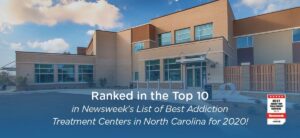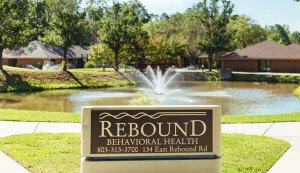North Carolina Drug Rehabs




Wilmington Treatment Center
Wilmington , NC

Lynchburg Comprehensive Treatment Center
Lynchburg , VA

Rebound Behavioral Health Hospital
Lancaster , SC


New River Comprehensive Treatment Center
Galax , VA
North Carolina Addiction Treatment
The nationwide Heroin epidemic has also affected the state of North Carolina. In 2020, reported overdose deaths in the US increased by 30% putting it at a record high. North Carolina’s overdose death increase, 34%, was greater than the national average. Opioids have been involved in more overdose deaths than any other substance in North Carolina. Between the years of 1999 to 2017, more than 13,000 residents of the state lost their lives to an Opioid overdose.
In 2019, just under 55,000 people were admitted to addiction treatment programs in North Carolina.
Treatment admissions from 2019 can be broken down by substance. Here are the substances with the highest percentages of admissions.
- Opioids – 28.4%
- Marijuana – 20%
- Alcohol – 11.8%
- Cocaine – 9.5%
- Amphetamines – 9.3%
- Heroin – 4.5%
Alcohol used with a secondary substance accounted for 7.7% of admissions in 2019.
A 2019 report showed that 8.14% of teenagers in North Carolina had used drugs in the last month. This amounts to 65,000 12 to 17 year olds in the state. In the wake of drug use reports among adolescents, North Carolina law enforcement agencies have increased their presence in schools to raise awareness and stop the cycle of drug abuse.
North Carolina is made up of many rural areas that are most vulnerable to drug trafficking, especially in the western parts of the state. Its vast terrain provides makes it easy to conceal drug-related criminal activities. For example, Methamphetamine production labs have been historically well-known in the state’s mountainous regions. In 2018, North Carolina had 127 Meth seizures putting it as the 5th state with the most incidents.
Drugs including heroin, cocaine, marijuana and methamphetamine are commonly transported by highway, air transit or waterway. Here’s a breakdown of how drugs are imported and exported through North Carolina’s regions:
- Highway: Interstate 95, which reaches from Miami to northern Maine, is one of the most heavily used highways for drug trafficking. Passing through areas of North Carolina like Fayetteville, vehicles carrying drugs along the interstate are typically destined for New York or Florida.
- Air transit: With hundreds of international flights coming in and out of the Charlotte Douglas International Airport, drugs are often carried in passengers’ luggage, shoes or clothing.
- Waterway: Through the 1990s, North Carolina’s two deep water ports experienced an influx of commercial vessels carrying drugs from the Middle East and Europe. After a crackdown by law enforcement officials, the number of drug seizures at the port has dramatically decreased.

Break free from addiction.
You have options. Talk about them with a treatment provider today.
Laws Of North Carolina Drug Use
North Carolina has strict legal consequences for drug possession, manufacturing and distribution. While an intent to distribute comes with a tougher sentence than personal possession, all drug-related cases face serious punishment.
Drug penalties are categorized by schedules. Each schedule is broken down by type of drug, risk of dependency and any accepted medical uses for the substance.
| Schedule | Drugs Included | First Offense | Second Offense |
|---|---|---|---|
| Schedule I | Heroin, Ecstasy, GHB, methaqualone, peyote, opiates | Class 1 felony, 4-5 months jail | Varies by amount of drug and previous offenses |
| Schedule II | Cocaine, Raw Opium, Codeine, Hydrocodone, Morphine,
Methadone, Methamphetamine, Ritalin (and others) |
Class 1 misdemeanor, 45 days in jail | Class 1 felony, 4-5 months in jail |
| Schedule III | Ketamine, Anabolic Steroids, Some Barbiturates (and others) | Class 1 misdemeanor, 45 days in jail | Class 1 felony, 4-5 months in jail |
| Schedule IV | Valium, Xanax, Rohypnol, Darvon, Clonazepam, Barbital (and others) | Class 1 misdemeanor, 45 days in jail | Class 1 felony, 4-5 months in jail |
| Schedule V | Over-the-counter cough medicines with codeine (and others) | Class 2 misdemeanor, 30 days in jail | Class 1 misdemeanor, 45 days in jail |
Marijuana Laws In North Carolina
Medical and recreational marijuana is illegal in the state of North Carolina. Sentences are less severe for those who have not faced a previous drug-related charge. First-time offenders may be placed on probation rather than serving time in jail. After successfully completing a drug education program as part of probation, the charges will be dismissed. However, for those with previous controlled substance convictions, a class 1 misdemeanor will be punished as a class I felon.
| Marijuana Amount | Criminal Charge | Potential Sentence |
|---|---|---|
| 0.5 ounces or less | Class 3 misdemeanor | $200 maximum fine |
| 0.5 to 1.5 ounces | Class 1 misdemeanor | 1 to 45 days in jail, plus a $1,000 maximum fine |
| 1.5 ounces to 10 lbs. or less | Class 1 felony | 3 to 8 months in jail, plus possible fine |
Addiction Treatment Laws In North Carolina
North Carolina’s harm reduction laws help to reduce the negative impact associated with drug use. Harm reduction programs are intended to improve the quality of life for communities that are most susceptible to addiction and drug-related crimes.
For instance, North Carolina’s 911 Good Samaritan law provides individuals with immunity from civil liability when they call for emergency aid after someone has overdosed. The law was designed to remove the fear many people experience when calling 911 for drug or alcohol-related emergencies. Those who call for help won’t be prosecuted for small amounts of drugs or underage drinking.
All 50 states have Good Samaritan laws but each jurisdiction is a little different.
As of August 2015, changes to the Good Samaritan law were enacted, allowing pharmacists to dispense naloxone under a standing order. With this change, people are now able to access, carry and administer Naloxone – a medication used to counter the harmful effects of an Opioid overdose. Between 2013 and 2020, the North Carolina Harm Reduction Coalition (NCHRC) has distributed more than 117,632 overdose rescue kits that contain Naloxone. This distribution has resulted in 16,378 confirmed reports that the medication was successful in saving an individual’s life.
Looking for a place to start?
Join the thousands of people that have called a treatment provider for rehab information.
Free and confidential
Available 24/7
Access to professional treatment
Prescription Drug Monitoring Program (PDMP)
Prescription Drug Monitoring Programs (PDMPs) allow states to monitor the number of controlled prescription drugs that are dispensed to patients. In North Carolina, the program is known as the Controlled Substances Reporting System (CSRS) and became operational in 2007.
The North Carolina CSRS works to:
- Identify and prevent diversion of prescribed controlled substances.
- Reduce misuse and abuse of controlled substances.
- Help physicians identify an addiction and refer patients to get treatment.
- Keeps community members informed about drug abuse and prevention.
- Reduce the number of fraudulent insurance claims.
- Provide patients with better overall care.
North Carolina Syringe Exchange Program (SEP)
The North Carolina Syringe Exchange Program (SEP) collects used syringes from residents and exchanges them for sterile syringes. Oftentimes, a syringe used by multiple individuals can become contaminated with a disease such as HIV or hepatitis C. Providing communities with sterile syringes helps reduce the number of infections traveling from person to person.
From 2018 to 2019, the NCHRC distributed nearly 1 million syringes to 3,500 participants in North Carolina.
SEPs play a vital role in helping to reduce the number of drug users. They usually offer recovery services including housing programs, career services and addiction treatment facilities to those in need. Although federal law prohibits the use of federal funds for exchange programs, SEPS can be found in 38 states as of 2021.
Drug Treatment Courts
North Carolina’s drug courts, or North Carolina Recovery Courts, were designed to help offenders with a substance use disorder (SUD) with court ordered treatment. There are 5 different types of treatment courts offered: family, adult, youth, DWI, mental health, and veterans. As of 2021, there are 61 recovery courts available in 32 of North Carolina’s counties.
Drug treatment court in North Carolina must be a 1 year commitment. The program consists of several structured activities including:
- Probation supervision
- Substance use disorder treatment
- Mental health treatment
- Drug and alcohol testing
- Case management
- Bi-monthly court sessions with recovery court judge and team
Treatment Centers in North Carolina
With increasing concerns over the amount of drug use in its state, North Carolina has created different addiction treatment solutions for its residents. Many treatment centers accept Medicaid as well as private health insurance. For individuals without insurance, local organizations may step in and help with funding or provide financial assistance resources.
Throughout the state, treatment facilities may offer:
- Long-term addiction treatment.
- Short-term/90-day drug and alcohol treatment.
- Specialized inpatient rehab programs.
- Psychotherapy/Cognitive Behavioral Therapy.
- Medication-assisted therapy.
While researching rehab facilities, it’s important to look over all your options, including those that are out of state.
You may find that you want to go to a facility that is not in your home state. Sometimes an out-of-state treatment center can provide you with a different perspective than those closer to home. For example, going out of state will distance you from negative influences, as well as give you the chance to focus solely on your recovery. This may make all the difference in your long-term sobriety.
Help is available. Contact a treatment provider today.
Published:
Author
Jeffrey Juergens

-
Jeffrey Juergens earned his Bachelor’s and Juris Doctor from the University of Florida. Jeffrey’s desire to help others led him to focus on economic and social development and policy making. After graduation, he decided to pursue his passion of writing and editing. Jeffrey’s mission is to educate and inform the public on addiction issues and help those in need of treatment find the best option for them.
- More from Jeffrey Juergens
- Alabama
- Alaska
- Arizona
- Arkansas
- California
- Colorado
- Connecticut
- Delaware
- Florida
- Georgia
- Hawaii
- Idaho
- Illinois
- Indiana
- Iowa
- Kansas
- Kentucky
- Louisiana
- Maine
- Maryland
- Massachusetts
- Michigan
- Minnesota
- Mississippi
- Missouri
- Montana
- Nebraska
- Nevada
- New Hampshire
- New Jersey
- New Mexico
- New York
- North Carolina
- North Dakota
- Ohio
- Oklahoma
- Oregon
- Pennsylvania
- Rhode Island
- South Carolina
- South Dakota
- Tennessee
- Texas
- Utah
- Vermont
- Virginia
- Washington
- West Virginia
- Wisconsin
- Wyoming
- Guam
- Puerto Rico
- US Pacific Islands
- US Virgin Islands
- Washington D.C.
- American Samoa
Sources
Cities in North Carolina
Feature your center
Ready to connect with treatment seekers across the country? Enter your information to learn about our advertising options and get in contact with our development team.



